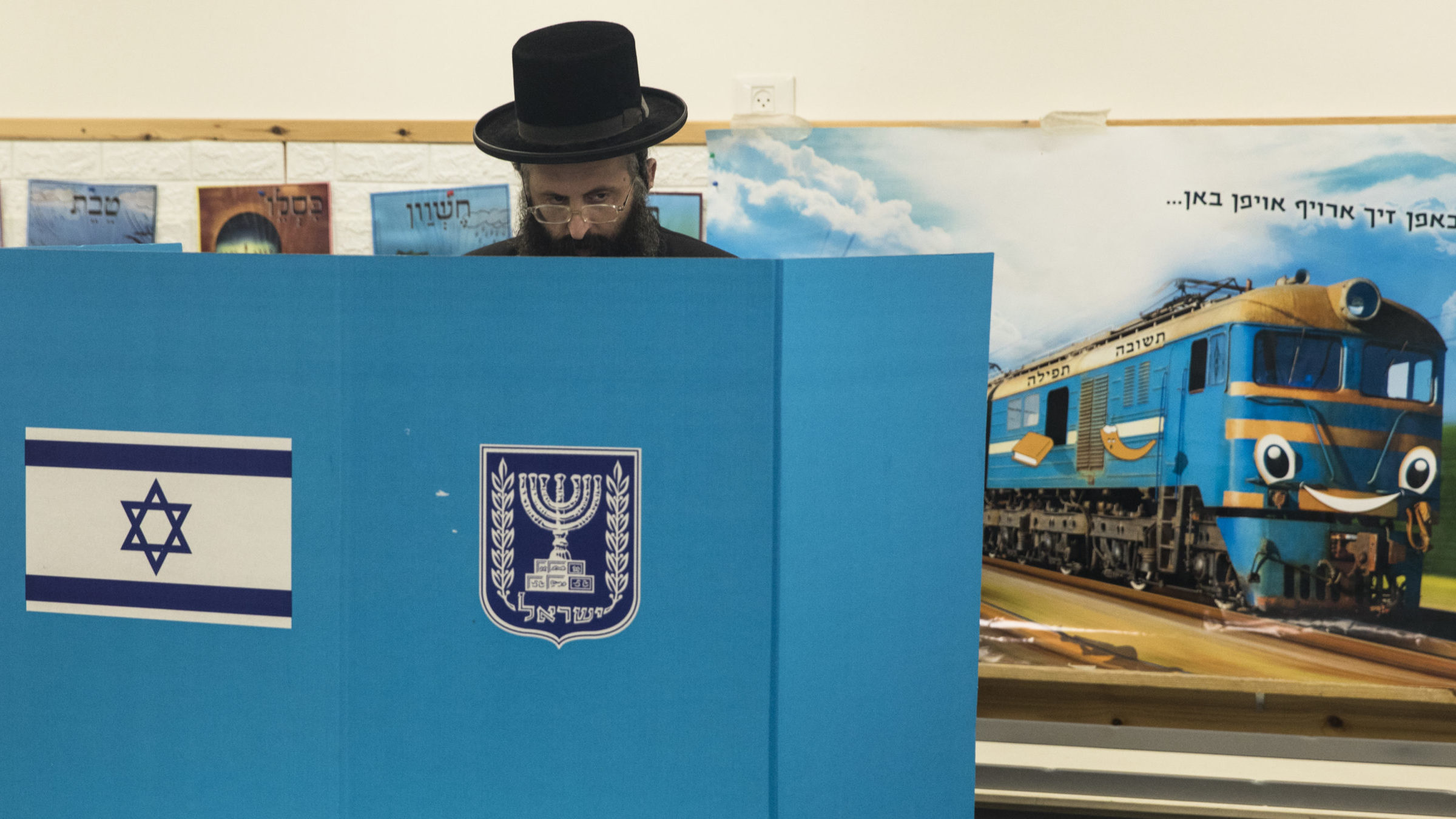High Turnout as Israel Goes to the Polls for 5th Time Since 2019
President calls on 'all citizens of this country’ to exercise their ‘democratic right’, while voters flocking to polling stations suggests eagerness to break years-long cycle of electoral deadlock
Israel’s leaders urged people to turn out to vote Tuesday as the politically divided country held national elections for the fifth time since April 2019, hoping that this time one of the two main blocs would receive enough support to form a stable government.
The repeated fervent calls to vote may have been redundant, however, as the country saw record high turnout throughout the morning, with Israelis apparently eager to end the cycle of electoral deadlock.
By 10 a.m., turnout had reached its highest since 1981, and by noon was at its highest since 1999. At midday, that figure stood at 28.4%, compared to 25.4% in the last elections in March 2021. That was not reflected in the turnout among Israel’s Arab sector, which comprises one-fifth of the population. According to Channel 12 television, Arab voter turnout by noon stood at just 12%.
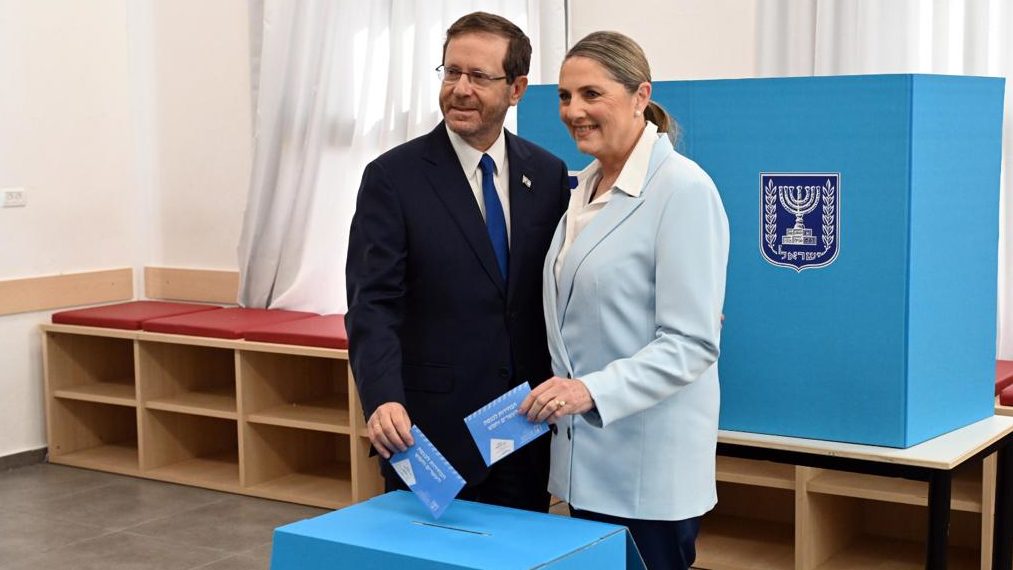
Israeli President Isaac Herzog and his wife. Michal, vote in Jerusalem on Nov. 1, 2022. (Haim Zach/GPO)
Polling stations opened at more than 12,000 locations across the country at 7 a.m., although some in smaller communities opened an hour later. The 6,788,804 eligible voters have until 10 p.m. to cast a ballot to help determine whether centrist Yesh Atid party leader Yair Lapid remains in the prime minister’s chair or right-wing Likud boss Binyamin Netanyahu makes a comeback after more than a year in opposition.
Voting in Jerusalem, President Isaac Herzog called on Israelis to take part in the democratic process, highlighting the fact that many around the world do not have that right.
“This is a thriving democracy with a multitude of voices. We should always respect this enormous right that we have, as there are so many nations and billions of human beings who unfortunately do not enjoy this right,” Herzog said after casting his ballot.
“I want to reiterate: Voting makes a difference, without a shadow of a doubt. Anyone who thinks that his or her vote doesn’t matter is wrong. I therefore call on all citizens of this country: Exercise your democratic right and go to vote!”
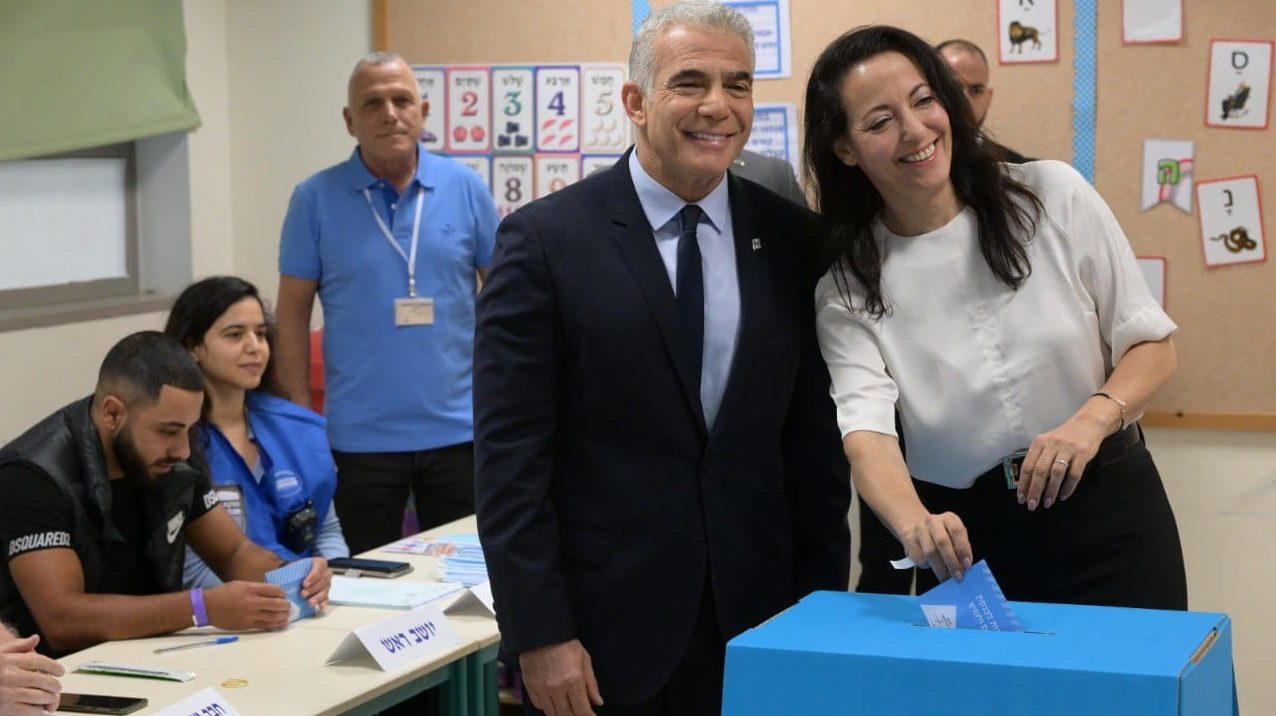
Israeli Prime Minister Yair Lapid and his wife, Lihi, vote in Tel Aviv on Nov. 1, 2022 (Amos Ben Gershom /GPO)
Prime Minister Lapid made a similar call as he cast his ballot at a school in Tel Aviv, accompanied by his wife, Lihi.
“Good morning, vote wisely. Vote for the State of Israel, the future of our children, and our future in general,” the prime minister said in an apparent reference to the name of his party, which translates to “There is a Future.”
Before voting, the prime minister visited the grave of his father, Yosef “Tommy” Lapid, a Serbian-born journalist and Holocaust survivor saved from the Budapest Ghetto by Raoul Wallenberg; Tommy Lapid later served as an Israeli cabinet minister.
The final opinion polls released in the run-up to Election Day suggested that neither the center-left camp led by the prime minister nor the right-wing-religious bloc headed by Opposition Leader Binyamin Netanyahu could muster the 61 seats needed to capture a majority in the 120-seat Knesset, Israel’s parliament,
With the tight race in mind, Lapid’s predecessor Netanyahu made a call on Facebook for his party’s voters to turn out on Tuesday.
“We voted Likud. Now it’s your turn,” read the message alongside a photo of the former prime minister and his wife Sara holding up voting slips for their party. “We are in a tie, everything depends on you. Go vote for Likud now!”
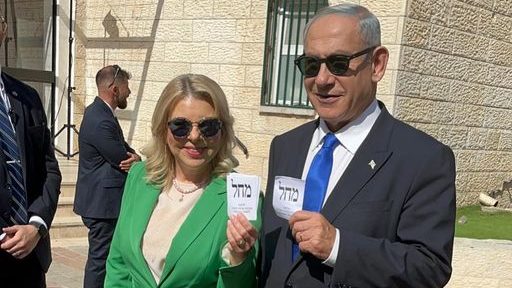
Likud party head and former prime minister Binyamin Netanyahu and his wife, Sara, vote in Jerusalem on Nov. 1, 2022. (Facebook)
Even so, Zvika from the central city of Holon told The Media Line that he is not voting in this election, for the first time ever.
“I’m 65, I was born here in Israel, I voted every time that there were elections, I ran to vote. Today I don’t believe in anyone,” he said. “I feel that they’ve wrung me out; they’re laughing at me, playing me, don’t tell the truth. I’m not playing their games anymore.”
He said that while he was never committed to one particular camp, his faith in politicians from across the spectrum has been eroded into nonexistence.
“I have no problem zigzagging between candidates and parties. I look specifically at what is happening in the country and I vote according to my conscience and what I see at that moment, at that period in time,” he said.
But now, he added, “I don’t believe in anyone.”
According to Zvika, the only thing that concerns him now is the defense of the state, which he believes “depends on the IDF and all the security bodies. I think that we’ll always have security,” he said.
Chaya, a 31-year-old high-tech worker from Tel Aviv, told The Media Line that she was voting on Tuesday, as she has done in every election, despite her disillusionment with the political system.
“I feel like our ‘leaders’ are busy trying to be elected and essential matters are neglected, which is unfortunate because Israel is becoming more and more difficult to live in,” Chaya said.
“Unfortunately I don’t have a clear answer for that,” she concluded.
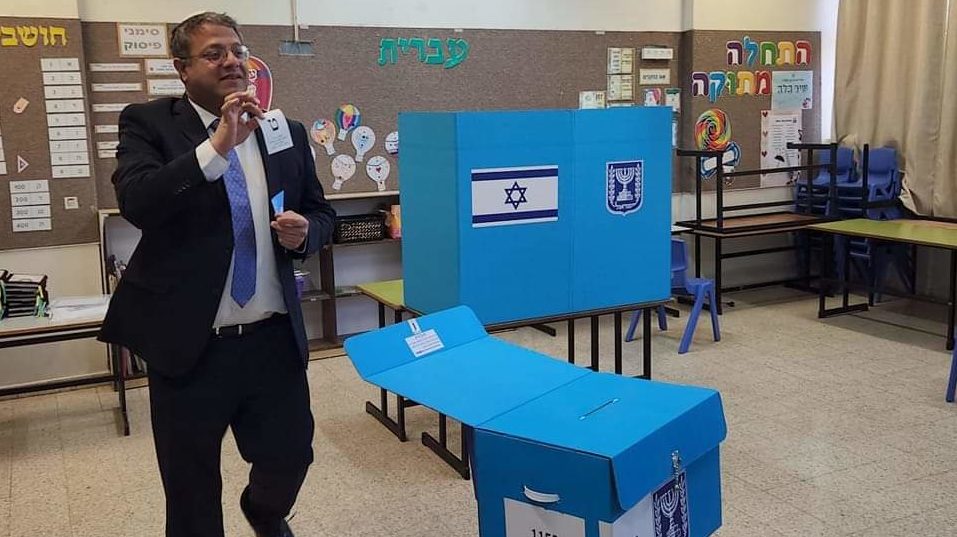
Religious Zionism lawmaker Itamar Ben-Gvir voting in Kiryat Arba in the West Bank, on Nov. 1, 2022. (Dario Sanchez/The Media Line)
Casting his vote in the West Bank settlement of Kiryat Arba, far-right Knesset member Itamar Ben-Gvir paid tribute to Netanyahu, the leader of the bloc of which his Religious Zionism party is a member, but said that his primary concern is installing a government that reflects his own values.
“I love him dearly, he knows that,” Ben-Gvir said of Netanyahu, who played a key role in bringing his own Otzma Yehudit (Jewish Power) party under the umbrella of Bezalel Smotrich’s Religious Zionism. But, he added, he wants a government that includes him and has the “ideology of the right.”
Smotrich, meanwhile, cast his ballot in the settlement of Kedumim, where he also urged Israelis to go out to vote. Election Day in Israel is a national holiday to encourage voter turnout.
Voting in the predominantly ultra-Orthodox city of Bnei Brak near Tel Aviv, United Torah Judaism party leader Moshe Gafni repeated the call for people to vote, saying he hoped for a definitive outcome to the election that would mark the end of serial voting in the country.
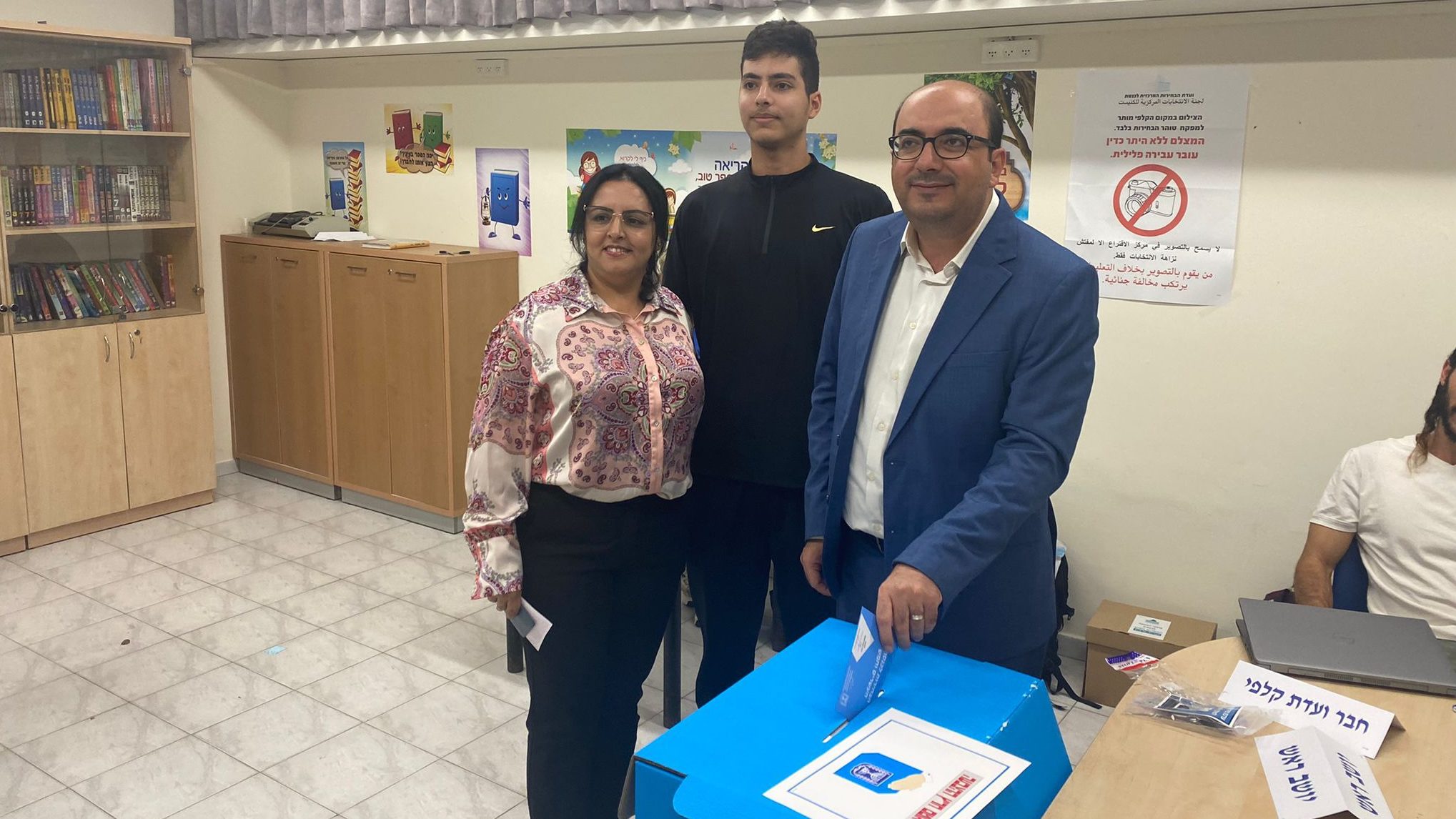
Sami Abu Shehadeh, head of the Balad party votes in the mixed Jewish-Arab city of Jaffa in central Israel on Nov. 1, 2022. (Courtesy)
Zehava Gal-On and Merav Michaeli, the leaders of the left-wing parties of Meretz and Labor, cast their ballots in the cities of Petah Tikvah and Tel Aviv, respectively.
Both Labor and Meretz have expressed concern about making it across the electoral threshold of 3.25% of the total ballots cast in order to be included in the Knesset, as members of their voter base moved to shore up Lapid’s chances of remaining in power. But both parties are members of Lapid’s bloc and have issued a plea for their voters to help keep them in the Knesset.

